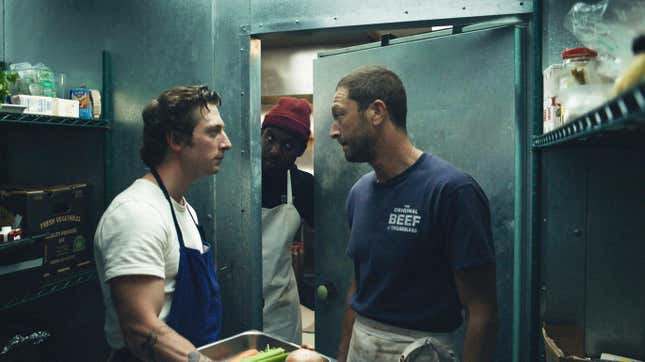
Everybody is still talking about The Bear, some after doing multiple rewatches—at just eight episodes, each less than 30 minutes, it goes down easy again and again. And who better to consult in a water cooler chat about the show’s details than the star himself? When Jeremy Allen White came to Chicago last week, I was lucky enough to do just that.
It’s clear from the way White talks about his role as Carmy Berzatto that he is not only a genuine fan of the series but also takes every detail extremely seriously. He really tried to depict this character as accurately as possible—he trained in real restaurant kitchens, for goodness sake—even if that means things get emotionally messy.
“I think a kitchen is the only place that Carmy’s felt truly safe and good about himself for a long time,” White says of The Bear’s central character. “But then he steps into this environment which isn’t functioning the way it should from his perspective. You’re meeting him at such a wobbly moment, because he’s dealing with the death of his brother, he is in a kitchen but it’s not being run properly, and so he can’t even feel good and safe in the place that’s so cherished to him.”
We learn through the course of the series that Carmy came up under a verbally and emotionally abusive chef—an unfortunately common path for many restaurant workers of a certain age, as White discovered in discussions with some of the country’s top chefs. Yet while the ridicule may have made him the meticulous cook he is, Carmy (like his real-life counterparts) wants to run his kitchen differently. What The Bear depicts, in that sense, is a flawed execution of best intentions, and a potential roadmap for how real-life kitchen workers can support and empower young staffers, women, and people of color who hold back-of-house roles.
“I think I’m aware as an actor looking at Carmy’s actions, saying like, ‘Give Sydney [Ayo Edebiri] more space,’” White says, “but I also have to understand, speaking against chef the way Sydney does so frequently would never, ever happen in the world that Carmy is coming from. So it’s a struggle.”
The tight quarters and high stakes of a restaurant kitchen can mean that change happens slowly or unevenly. “I think Carmy does want to do the right thing, and he wants to give chef Sydney room and space and creative control, but also, to come up against so much friction with a sous chef, that’s insane from Carmy’s perspective,” says White.
A similar dynamic is explored through the character of Marcus (played by Lionel Boyce), who has aspirations to be a fine dining chef as Carmy once was, but doesn’t necessarily play by the rules to get there. The defining moment between Carmy and Marcus comes in one subtle reaction in episode seven, “Review.” After a chaotic day that brings out Carmy’s worst tendencies, Carmy crouches down next to a doughnut that he smashed to the floor earlier in the episode. It’s Marcus’s doughnut, his passion project, and after one bite Carmy suddenly has this connection to Marcus as a chef that he hadn’t before.
“That was a moment we went back and forth on a lot, because on the page it’s kind of crazy,” White says. “It’s like, he went through this insane thing, and then there’s a doughnut on the ground, and he tries it, and I was like, I don’t know, I don’t know if it’s going to work. But I’m so glad we did it because I think it does make sense for Carmy and people like him. He wanted to know, and he learned that Marcus is doing so well, and it just made an already awful day even worse.”
That communication and understanding through food (and not necessarily words or actions) is a mark of many chefs, one that has rarely been captured with such nuance on screen as in that moment. The Bear has received praise for its accurate portrayal of kitchen life, and the actors seem to understand that goes beyond just practicing knife cuts and marking delis with green tape—there’s a very specific way of emoting and creating dynamics with others that is unique to the back-of-house community. And that’s a recipe that White and company have damn near perfected.